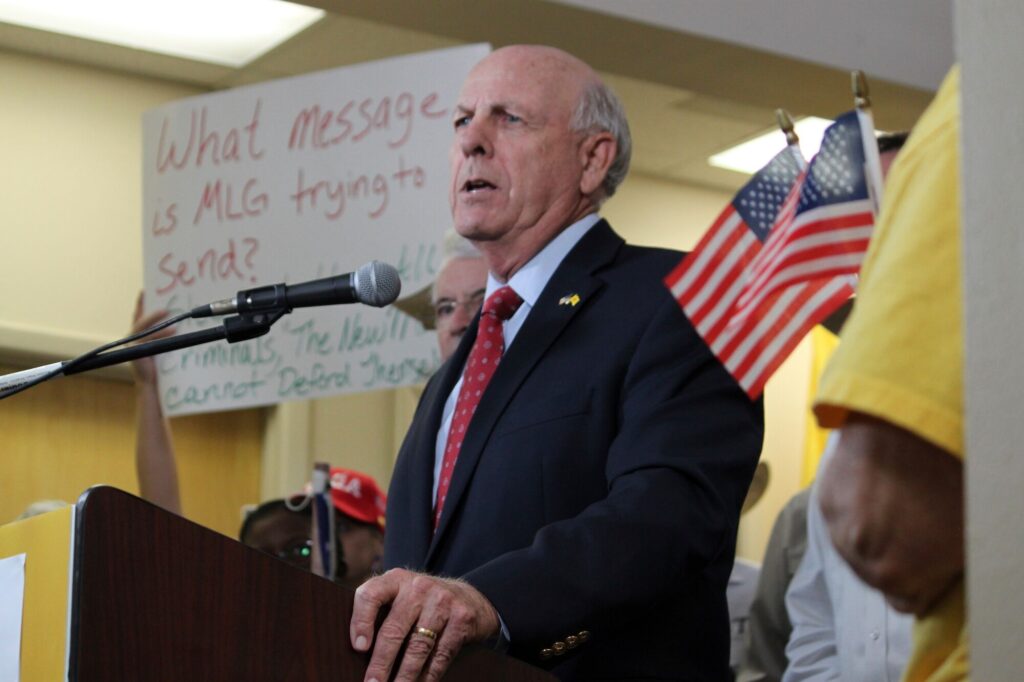Colorado oil and gas commission get an earful on SB181 rules

Environmental activists Wednesday took to task the Colorado Oil and Gas Conservation Commission, and the commission’s executive director, Jeff Robbins, for continuing to approve oil and gas drilling permits that they say should be halted until new rules are adopted, if at all.
Meanwhile, an industry representative said Colorado already has some of the nation’s toughest oil and gas rules, adding that drillers are committed to safety.
Wednesday’s hearing, at the Margaret Carpenter Recreation Center in Thornton, is the first of two days of public comment on rulemaking tied to several provisions of Senate Bill 181, which called for major changes in how Colorado. The second session is scheduled for 4 p.m. at the Erie Community Center on Thursday.
Gov. Jared Polis signed SB 181 into law on April 16. It’s intended to change how the state regulates the oil and gas industry. Among the bill’s major provisions: A mission change for the COGCC, which would go from a commission that focuses on fostering the development of oil and natural gas to one whose prime duty is to regulate the industry in a manner that would protect public health and safety and the environment.
Environmental activists’ comments, often angry and emotional, dominated the public comment session Wednesday afternoon. Others accused Robbins and the commissioners of colluding with the oil and gas industry and of making backroom deals for the sake of profits over public health and safety.
Polis, who has long supported more regulation of oil and gas, wasn’t spared, either. Several noted that it’s been six months since the law was passed and that new rules have yet to be adopted, while the commission continues to approve oil and gas drilling permits.
Some of the young people who participated in last Friday’s Climate Strike Action Week protests showed up at the commission hearing and spoke to reporters prior to the beginning of the public comment session.
Sophia Shivers, a high school senior from Niwot, said she is tired of hearing about wells going up around Colorado under “a progressive and supposedly climate-championing administration.”
“The climate crisis is taking a toll on our future,” she said. “We are dangerously behind and have no time to waste.”
Anne Lee Foster of the environmental group Colorado Rising accused Robbins of siding with the industry. She claimed he had said on a conference call that the COGCC was now approving more drilling permits than before SB181 was passed.
That’s incorrect, said COGCC spokeswoman Megan Castle, who said that Robbins never made that claim, and that the number of permits approved is about 28 per month. It was about 40 per month prior to the passage of SB181, she said.
Wednesday’s session was intended to draw input on rulemaking tied to provisions contained within SB181, including mission change, flowlines/pipelines, alternative location analysis, and cumulative impacts of oil and gas development.
Rulemaking, according to an Aug. 1 update from the COGCC, is expected to continue well into 2020.
In the last few months, the COGCC has doubled its staff of location specialist analysts, from three to six, and hired a public relations specialist.
Foster complained that the COGCC has yet to hire a scientist who could study the impacts of oil and gas on health. “Why are we streamlining permitting when we haven’t taken the time to evaluate health and safety?” she asked.
As to the scientists, “we expect them to evaluate data and make an educated decision on an appropriate way to move forward on permits,” Foster said.
She also said that Robbins, in formulating what the new law calls “objective criteria” that are intended to guide the commission during the rulemaking process, did not rely on scientific data or health studies.
“You put your money where your mouth is — they’re putting money toward controlling the public image and to streamline permitting — but not toward fulfilling the mandate of the law, making sure they are protecting health and safety,” Foster told reporters.
The objective criteria are a midway point between the old system and the new. SB181 grants the director temporary authority, while the rulemaking process is underway, to delay final determinations on permit applications if the director determines, under those objective criteria, that the permit requires additional analysis to ensure public health and safety or to consult with other state or local governments.
Those objective criteria, and the language in SB 181, are cited by activists as a reason to shut down all permitting until the rulemaking process is completed, which isn’t likely to take place before 2020, based on the COGCC’s current timelines.
However, the criteria also state that the law does not require Robbins to delay all permit determinations until these rules are promulgated. The director can delay specific permits until he’s satisfied that the permit complies with SB181 and can approve it prior to the completion of the rulemaking process.
“We stand with a vast majority of those in this discussion, including the leading proponents of Senate Bill 181 and the COGCC, in opposing a ban on new energy development while we collectively address years of rulemakings to come,” according to a statement Thursday from Lynn Granger, executive director of the Colorado Petroleum Council,. “Pitting environmental goals against the working families who rely on affordable Colorado energy in every facet of their daily lives is the wrong approach. We will continue to work with all stakeholders, address concerns, and have reasonable conversations about the future of energy production in Colorado.”
Bob Randall, former executive director of the Department of Natural Resources and now a lawyer in private practice, testified on behalf of Erin Martinez, whose home in Firestone blew up in 2017 when an abandoned pipeline leaked natural gas into her home, killing her husband and brother and injuring her and her son.
Martinez is focused on ensuring that what happened to her doesn’t happen again, Randall told the commissioners. What she wants is to see flowlines mapped and abandoned lines removed. She is disappointed that a staff summary on flowlines didn’t include abandoned or inactive flowlines. Those provisions were included in SB181 because of the Martinez explosion, Randall said.
Robbins replied that commissioners are aware of Martinez’ concerns and have asked that those issues be incorporated into stakeholder discussions and to the rulemaking process.
Colorado already has the strongest flowline regulations in the country, completed last year, Granger told the commission.
The new regulations, which have yet to be fully implemented, improve safety and increase transparency, she said, and they also provide more stringent provisions for dealing with abandoned flowlines.
Safety is the industry’s top priority, and it will continue to look for ways to improve, she added.
Former Arapahoe County commissioner John Brackney told commissioners the new flowline regulations make safety of the public and workers a top priority.
“Oil and gas a critical part of economy and to the nation’s security, Please keep that balancing act secure,” he asked. “It’s important to have a job in addition to good health and safety.”
Democratic state Sen. Mike Foote of Lafayette, one of the co-sponsors of SB181, said the six-month mark is a good point to see where things stand. SB 181 was a “real paradigm shift” when it comes to oil and gas, and not just another regulation the industry has to follow, he said.
The question prior to SB181 was not whether operators would be able to drill, but where and when. Now, he said, “its should be ‘whether'” and if the operation is consistent with public health and safety. If it’s not, the answer should be ‘no.'”
Foote said that many of the permits granted since the passage of SB 181 have not been controversial; they haven’t been located in neighborhoods or are permits that would get pushback from local governments.
“You have difficult decisions coming up” on permits that may be sited near neighborhoods or which may be opposed by local governments. “It will be interesting to see how those decisions come out,” he told commissioners.














